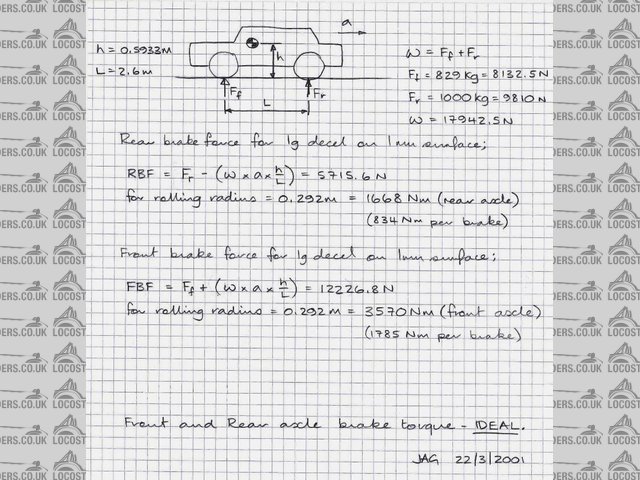
Calculating brake torque - one for the race car engineers...
flak monkey - 12/10/06 at 01:26 PM
Hi Gents,
Do any of you who have experience of designing race cars etc have a good way of calculating the brake torque that is required from a braking
system.
I am guessing that you take the weight of the car, mutliply it by the number of G you pull while braking, split the braking effort front/rear (eg
70/30) to calculate the force required at the contact patch mutliplied by the distance to the centre of the brake pad? To give you a torque that the
pads must produce to give that stopping power.
Does this sound correct? If not, whats the correct way to do it?
Cheers,
David
PS I have tried google, but either I am searching for the wrong thing, or theres nothing on there.
JAG - 12/10/06 at 01:53 PM
Hi David,
Your method will tell you the torque at the pads based upon an assumed brake force distribution.
However the brake force distribution can also be calculated and is dependant upon wheel base and the height of the centre of gravity.
If you want full details drop me an email - it's part of what I do for a living 
[Edited on 12/10/06 by JAG]
Ivan - 12/10/06 at 02:34 PM
Hi
Not sure what you want to achieve with the calculation but if it's to do with checking on impact of selecting different braking components have a
look at the book "How to make your car handle" by "Fred Puhn".
Under chassis modifications he deals fairly well with calculating the impact of component selection on pedal pressure.
JAG - 12/10/06 at 02:55 PM
Here's one I did a littlle while ago....


Calc' for IDEAL brake force.
That get's it down to the IDEAL torque for each axle at a set deceleration. 1g in the example above.
If you want tangential force at the brake pads divide the brake torque by the distance from the axle centreline to the centre of the pads, called the
'effective radius' in the business 
All used at your own risk etc... with no guarantees from me 


[Edited on 12/10/06 by JAG]
flak monkey - 12/10/06 at 03:17 PM
Thanks a lot Justin, you are a star! 
v8kid - 12/10/06 at 03:44 PM
Try this spreadsheet. Does the same thing but easier to play around with different figures
v8kid - 12/10/06 at 03:44 PM
And another slightly different one




